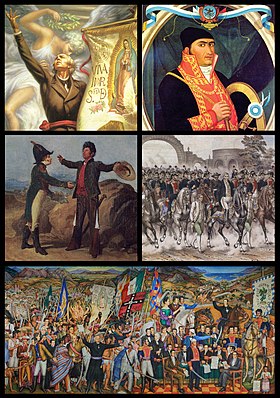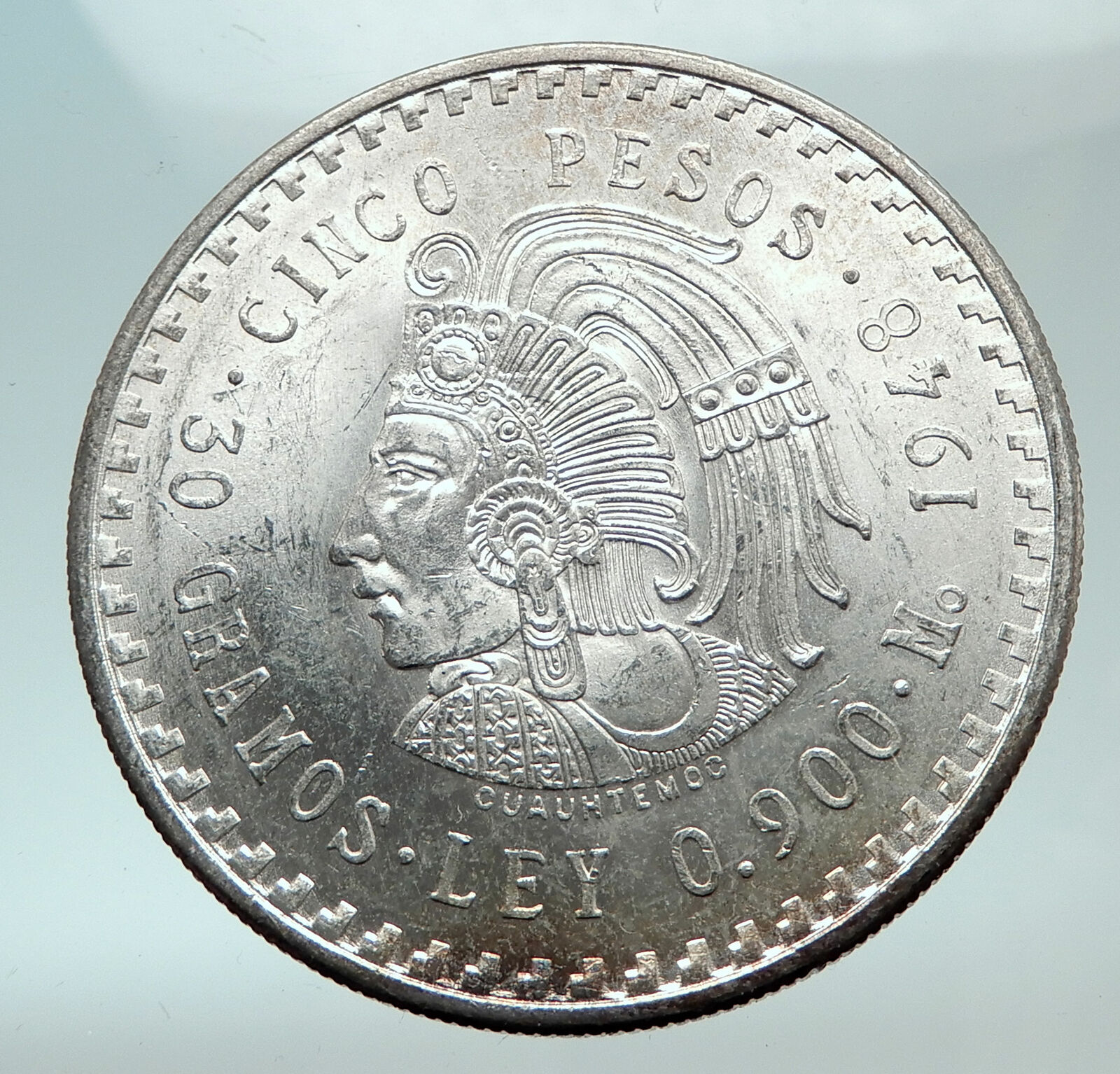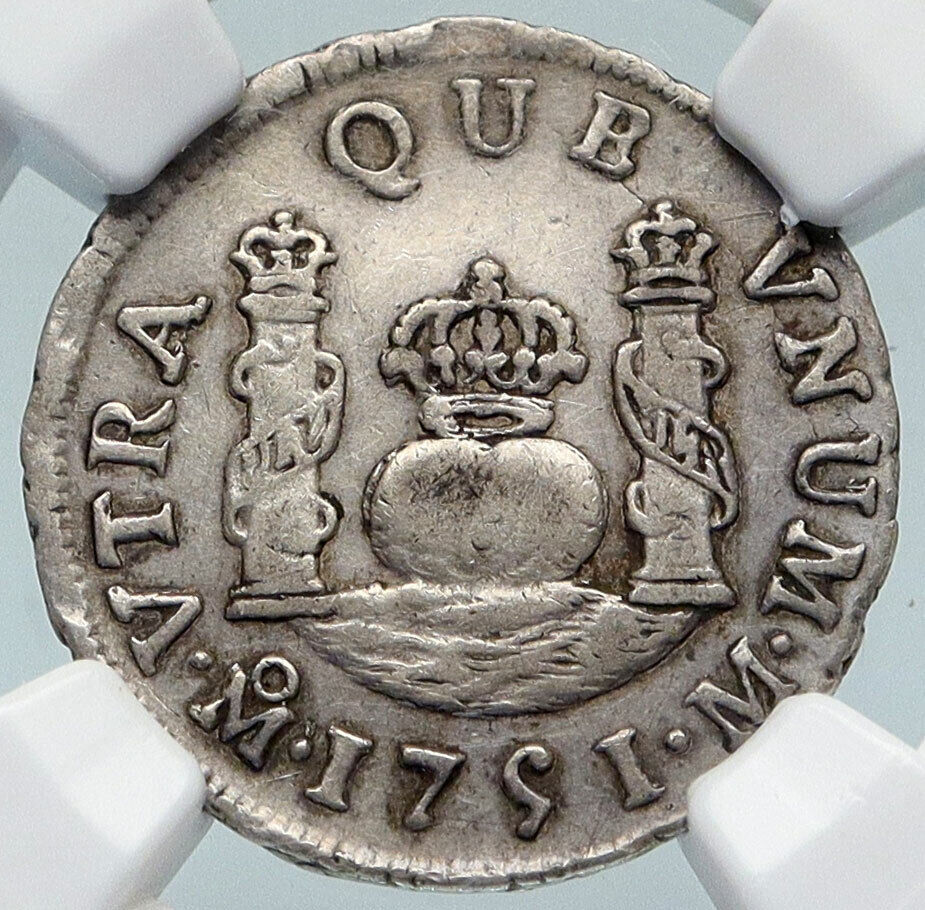|
Mexico
1978 100 Pesos 38mm (27.91 grams) 0.720 Silver (0.6428 oz. ASW)
Reference: KM# 483.2
ESTADOS UNIDOS MEXICANOS, Eagle on cactus eating snake, emblem of Mexico, with legend above. CIEN PESOS Mo PLATA PURA 20 Gr. LEY .720, Morelos facing forward with denomination at left, date at right, and silver purity and weight below.
You are bidding on the exact item pictured, provided with a Certificate of Authenticity and Lifetime Guarantee of Authenticity.
 José María Teclo Morelos y Pavón (September 30, 1765, City of Valladolid, now Morelia, Michoacán – December 22, 1815, San Cristóbal Ecatepec, State of México) was a Mexican Roman Catholic priest and revolutionary rebel leader who led the Mexican War of Independence movement, assuming its leadership after the execution of Miguel Hidalgo y Costilla in 1811. He was captured by the Spanish royalist military, tried by the Inquisition, defrocked as a cleric, and executed by civil authorities for treason in 1815. José María Teclo Morelos y Pavón (September 30, 1765, City of Valladolid, now Morelia, Michoacán – December 22, 1815, San Cristóbal Ecatepec, State of México) was a Mexican Roman Catholic priest and revolutionary rebel leader who led the Mexican War of Independence movement, assuming its leadership after the execution of Miguel Hidalgo y Costilla in 1811. He was captured by the Spanish royalist military, tried by the Inquisition, defrocked as a cleric, and executed by civil authorities for treason in 1815.
The Mexican War of Independence (Spanish: Guerra de Independencia de México) was an armed conflict, and the culmination of a political and social process which ended the rule of Spain in 1821 in the territory of New Spain. The war had its antecedent in the French invasion of Spain in 1808; it extended from the Grito de Dolores by Father Miguel Hidalgo y Costilla on September 16, 1810, to the entrance of the Army of the Three Guarantees led by Augustín de Iturbide to Mexico City on September 27, 1821. September 16 is celebrated as Mexican Independence Day.
 The movement for independence was inspired by the Age of Enlightenment and the liberal revolutions of the last part of the 18th century. By that time the educated elite of New Spain had begun to reflect on the relations between Spain and its colonial kingdoms. Changes in the social and political structure occasioned by Bourbon reforms and a deep economic crisis in New Spain caused discomfort among the Creole (native-born) elite. The movement for independence was inspired by the Age of Enlightenment and the liberal revolutions of the last part of the 18th century. By that time the educated elite of New Spain had begun to reflect on the relations between Spain and its colonial kingdoms. Changes in the social and political structure occasioned by Bourbon reforms and a deep economic crisis in New Spain caused discomfort among the Creole (native-born) elite.
Political events in Europe had a decisive effect on events in most of Spanish America. In 1808, King Charles IV and Ferdinand VII abdicated in favor of French leader Napoleon Bonaparte, who left the crown of Spain to his brother Joseph Bonaparte. The same year, the ayuntamiento (city council) of Mexico City, supported by viceroy José de Iturrigaray, claimed sovereignty in the absence of the legitimate king. That led to a coup against the viceroy; when it was suppressed, the leaders of the movement were jailed.
Despite the defeat in Mexico City, small groups of conspirators met in other cities of New Spain to raise movements against colonial rule. In 1810, after being discovered, Querétaro conspirators chose to take up arms on September 16 in the company of peasants and indigenous inhabitants of Dolores (Guanajuato), who were called to action by the secular Catholic priest Miguel Hidalgo, former rector of the Colegio de San Nicolás Obispo.
From 1810 the independence movement went through several stages, as leaders were imprisoned or executed by forces loyal to Spain. At first they recognized the sovereignty of Ferdinand VII over Spain and its colonies, but later the leaders took more radical positions, including such issues of social order as the abolition of slavery. Secular priest José María Morelos called the separatist provinces to form the Congress of Chilpancingo, which gave the insurgency its own legal framework. After the defeat of Morelos, the movement survived as a guerrilla war under the leadership of Vicente Guerrero. By 1820, the few rebel groups survived most notably in the Sierra Madre del Sur and Veracruz.
The reinstatement of the liberal Constitution of Cadiz in 1820 caused a change of mind among the elite groups who had supported Spanish rule. Monarchist Creoles affected by the constitution decided to support the independence of New Spain; they sought an alliance with the former insurgent resistance. Agustín de Iturbide led the military arm of the conspirators and in early 1821 he met Vicente Guerrero. Both proclaimed the Plan of Iguala, which called for the union of all insurgent factions and was supported by both the aristocracy and clergy of New Spain. It called for monarchy in an independent Mexico. Finally, the independence of Mexico was achieved on September 27, 1821.
After that, the mainland of New Spain was organized as the Mexican Empire. This ephemeral Catholic monarchy changed to a federal republic in 1823, due to internal conflicts and the separation of Central America from Mexico.
After some Spanish reconquest attempts, including the expedition of Isidro Barradas in 1829, Spain under the rule of Isabella II recognized the independence of Mexico in 1836.
 Mexico, officially the United Mexican States, is a federal republic in North America. It is bordered on the north by the United States; on the south and west by the Pacific Ocean; on the southeast by Guatemala, Belize, Mexico, officially the United Mexican States, is a federal republic in North America. It is bordered on the north by the United States; on the south and west by the Pacific Ocean; on the southeast by Guatemala, Belize,  and the Caribbean Sea; and on the east by the Gulf of Mexico. Covering almost two million square kilometres (over 760,000 sq mi), Mexico is the fifth largest country in the Americas by total area and the 13th largest independent nation in the world. With an estimated population of over 113 million, it is the eleventh most populous and the most populous Spanish-speaking country in the world and the second most populous country in Latin America. Mexico is a federation comprising thirty-one states and a Federal District, its capital and largest city. and the Caribbean Sea; and on the east by the Gulf of Mexico. Covering almost two million square kilometres (over 760,000 sq mi), Mexico is the fifth largest country in the Americas by total area and the 13th largest independent nation in the world. With an estimated population of over 113 million, it is the eleventh most populous and the most populous Spanish-speaking country in the world and the second most populous country in Latin America. Mexico is a federation comprising thirty-one states and a Federal District, its capital and largest city.
In pre-Columbian Mexico many cultures matured into advanced civilizations such as the Olmec, the Toltec, the Teotihuacan, the Zapotec, the Maya and the Aztec before first contact with Europeans. In 1521, the Spanish Empire conquered and colonized the territory from its base in Mexico-Tenochtitlan, which was administered as the Viceroyalty of New Spain. This territory would eventually become Mexico following recognition of the colony’s independence in 1821. The post-independence period was characterized by economic instability, the Mexican-American War that led to the territorial cession to the United States, the Pastry War, the Franco-Mexican War, a civil war, two empires and a domestic dictatorship. The latter led to the Mexican Revolution in 1910, which culminated with the promulgation of the 1917 Constitution and the emergence of the country’s current political system. In March 1938, through the Mexican oil expropriation private U.S. and Anglo-Dutch oil companies were nationalized to create the state-owned Pemex oil company.
 Mexico has one of the world’s largest economies, it is the tenth largest oil producer in the world, the largest silver producer in the world and is considered both a regional power and middle power. In addition, Mexico was the first Latin American member of the Organisation for Economic Co-operation and Development OECD (since 1994), and considered an upper-middle income country by the World Bank. Mexico is considered a newly industrialized country and an emerging power. It has the fifteenth largest nominal GDP and the tenth largest GDP by purchasing power parity. The economy is strongly linked to those of its North American Free Trade Agreement (NAFTA) partners, especially the United States. Mexico ranks sixth in the world and first in the Americas by number of UNESCO World Heritage Sites with 32, and in 2010 was the tenth most visited country in the world with 22.5 million international arrivals per year. According to Goldman Sachs, by 2050 Mexico is expected to become the world’s fifth largest economy. PricewaterhouseCoopers (PwC) estimated in January 2013 that by 2050 Mexico could be the world’s seventh largest economy. Mexico has membership in prominent institutions such as the UN, the WTO, the G20 and the Uniting for Consensus. Mexico has one of the world’s largest economies, it is the tenth largest oil producer in the world, the largest silver producer in the world and is considered both a regional power and middle power. In addition, Mexico was the first Latin American member of the Organisation for Economic Co-operation and Development OECD (since 1994), and considered an upper-middle income country by the World Bank. Mexico is considered a newly industrialized country and an emerging power. It has the fifteenth largest nominal GDP and the tenth largest GDP by purchasing power parity. The economy is strongly linked to those of its North American Free Trade Agreement (NAFTA) partners, especially the United States. Mexico ranks sixth in the world and first in the Americas by number of UNESCO World Heritage Sites with 32, and in 2010 was the tenth most visited country in the world with 22.5 million international arrivals per year. According to Goldman Sachs, by 2050 Mexico is expected to become the world’s fifth largest economy. PricewaterhouseCoopers (PwC) estimated in January 2013 that by 2050 Mexico could be the world’s seventh largest economy. Mexico has membership in prominent institutions such as the UN, the WTO, the G20 and the Uniting for Consensus.
|





 José María Teclo Morelos y Pavón (September 30, 1765, City of Valladolid, now Morelia, Michoacán – December 22, 1815, San Cristóbal Ecatepec, State of México) was a Mexican Roman Catholic priest and revolutionary rebel leader who led the Mexican War of Independence movement, assuming its leadership after the execution of Miguel Hidalgo y Costilla in 1811. He was captured by the Spanish royalist military, tried by the Inquisition, defrocked as a cleric, and executed by civil authorities for treason in 1815.
José María Teclo Morelos y Pavón (September 30, 1765, City of Valladolid, now Morelia, Michoacán – December 22, 1815, San Cristóbal Ecatepec, State of México) was a Mexican Roman Catholic priest and revolutionary rebel leader who led the Mexican War of Independence movement, assuming its leadership after the execution of Miguel Hidalgo y Costilla in 1811. He was captured by the Spanish royalist military, tried by the Inquisition, defrocked as a cleric, and executed by civil authorities for treason in 1815. The movement for independence was inspired by the Age of Enlightenment and the liberal revolutions of the last part of the 18th century. By that time the educated elite of New Spain had begun to reflect on the relations between Spain and its colonial kingdoms. Changes in the social and political structure occasioned by Bourbon reforms and a deep economic crisis in New Spain caused discomfort among the Creole (native-born) elite.
The movement for independence was inspired by the Age of Enlightenment and the liberal revolutions of the last part of the 18th century. By that time the educated elite of New Spain had begun to reflect on the relations between Spain and its colonial kingdoms. Changes in the social and political structure occasioned by Bourbon reforms and a deep economic crisis in New Spain caused discomfort among the Creole (native-born) elite. Mexico, officially the United Mexican States, is a federal republic in North America. It is bordered on the north by the United States; on the south and west by the Pacific Ocean; on the southeast by Guatemala, Belize,
Mexico, officially the United Mexican States, is a federal republic in North America. It is bordered on the north by the United States; on the south and west by the Pacific Ocean; on the southeast by Guatemala, Belize,  and the Caribbean Sea; and on the east by the Gulf of Mexico. Covering almost two million square kilometres (over 760,000 sq mi), Mexico is the fifth largest country in the Americas by total area and the 13th largest independent nation in the world. With an estimated population of over 113 million, it is the eleventh most populous and the most populous Spanish-speaking country in the world and the second most populous country in Latin America. Mexico is a federation comprising thirty-one states and a Federal District, its capital and largest city.
and the Caribbean Sea; and on the east by the Gulf of Mexico. Covering almost two million square kilometres (over 760,000 sq mi), Mexico is the fifth largest country in the Americas by total area and the 13th largest independent nation in the world. With an estimated population of over 113 million, it is the eleventh most populous and the most populous Spanish-speaking country in the world and the second most populous country in Latin America. Mexico is a federation comprising thirty-one states and a Federal District, its capital and largest city. Mexico has one of the world’s largest economies, it is the tenth largest oil producer in the world, the largest silver producer in the world and is considered both a regional power and middle power. In addition, Mexico was the first Latin American member of the Organisation for Economic Co-operation and Development OECD (since 1994), and considered an upper-middle income country by the World Bank. Mexico is considered a newly industrialized country and an emerging power. It has the fifteenth largest nominal GDP and the tenth largest GDP by purchasing power parity. The economy is strongly linked to those of its North American Free Trade Agreement (NAFTA) partners, especially the United States. Mexico ranks sixth in the world and first in the Americas by number of UNESCO World Heritage Sites with 32, and in 2010 was the tenth most visited country in the world with 22.5 million international arrivals per year. According to Goldman Sachs, by 2050 Mexico is expected to become the world’s fifth largest economy. PricewaterhouseCoopers (PwC) estimated in January 2013 that by 2050 Mexico could be the world’s seventh largest economy. Mexico has membership in prominent institutions such as the UN, the WTO, the G20 and the Uniting for Consensus.
Mexico has one of the world’s largest economies, it is the tenth largest oil producer in the world, the largest silver producer in the world and is considered both a regional power and middle power. In addition, Mexico was the first Latin American member of the Organisation for Economic Co-operation and Development OECD (since 1994), and considered an upper-middle income country by the World Bank. Mexico is considered a newly industrialized country and an emerging power. It has the fifteenth largest nominal GDP and the tenth largest GDP by purchasing power parity. The economy is strongly linked to those of its North American Free Trade Agreement (NAFTA) partners, especially the United States. Mexico ranks sixth in the world and first in the Americas by number of UNESCO World Heritage Sites with 32, and in 2010 was the tenth most visited country in the world with 22.5 million international arrivals per year. According to Goldman Sachs, by 2050 Mexico is expected to become the world’s fifth largest economy. PricewaterhouseCoopers (PwC) estimated in January 2013 that by 2050 Mexico could be the world’s seventh largest economy. Mexico has membership in prominent institutions such as the UN, the WTO, the G20 and the Uniting for Consensus.




